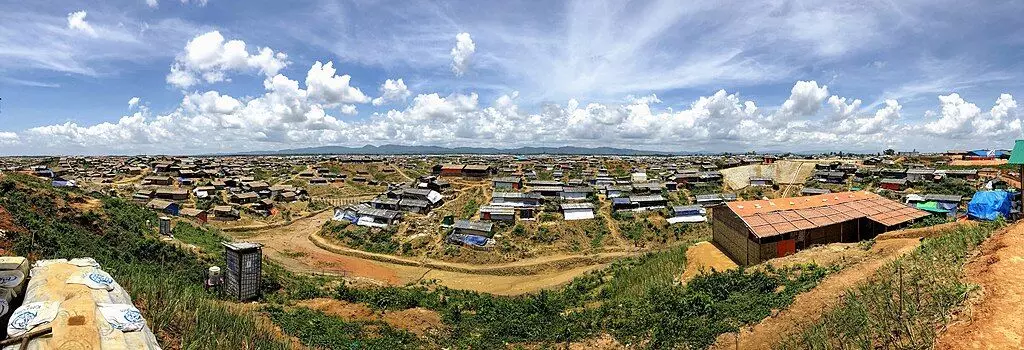Ratcheting imbroglio
The reports of collaborative functioning between the armed forces of Bangladesh and Myanmar at refugee camps could further invigorate the politicised Rohingya issue

Image courtesy: Tauheed / Wikimedia commons
Very recently, a confidential memo from a high-level meeting of Myanmar's junta has revealed that the Arakan Rohingya Salvation Army (ARSA), a Rohingya militant armed group, was the target of a deadly crackdown by a joint collaboration of the armies of Myanmar and Bangladesh. Although previous accounts of the memo highlighted internal dissent against the Myanmar government, the newly revealed minutes also expose the hitherto undisclosed functional collaboration between Bangladesh and Myanmar in dealing with the issue of ARSA.
The documents, emanating from a December 23 meeting of the Central Committee for Counter-Terrorism of the Bangladesh Ministry of Home Affairs, were published by the media recently. They discussed a paragraph which stated that during 2022, there had been only four clashes between Bangladesh forces and ARSA. Consequently, Bangladeshi special forces had launched a military operation in the refugee camp where ARSA was harboured, killing the ARSA's 2nd in-command and two terrorists. In an intelligence exchange with Bangladesh, it was revealed that the ARSA leader Ataullah and 60 of his followers were facing legal action in Bangladesh. Having received more than nearly 11 million Rohingya refugees in 2016 and 2017, Bangladesh has been urging the global community to pressurise Myanmar to take them back, and has supported efforts at the International Court of Justice (ICJ) and the International Criminal Court (ICC) to hold Myanmar to account.
Crucially, the disclosure of the joint operations between the armed forces of Bangladesh and Myanmar to target a refugee camp has the potential to harm the “humanitarian” reputation of Bangladesh. This seems true because the Home Minister of Bangladesh had characterised the operation as an attempt to combat drug-related problems. It may be recalled that a large number of Rohingyas have been complicit in a series of drug syndicates and other organised crimes.
The ongoing ICC investigation is subject to limitations, including that any alleged crime under investigation will be sufficiently linked to the situation that sparked off the investigation. This refers to the waves of violence directed against the Rohingyas in Myanmar in 2016 and 2017.
Furthermore, the Independent International Fact-Finding Mission on Myanmar was dissolved following the fulfilment of its mandate, but it has been replaced, in part, by the Independent Investigative Mechanism for Myanmar, established by the UN Human Rights Council in 2018. The mechanism has a mandate to collect evidence relating to the alleged commission of serious international crimes in Myanmar since 2011.
Meanwhile, according to an assessment by the UN, dated March 14 this year, the security situation within Cox’s Bazar operational area remains complex, fluid, and unpredictable. Drug-related crimes, road traffic accidents and fires still remain relevant threats in Cox’s Bazar. As already in the public domain, Rohingyas have been posing serious challenges to Bangladeshi security agencies on a number of security related issues.
On March 12, police arrested 27 Rohingyas who had attended the Jubo League conference at Forest Road area of Ukhiya Upazila in Cox’s Bazar. This shows involvement of several youths in the political activities of Bangladesh. Earlier, on March 10, a gunfire broke out between two rival groups in Nayapara camp in Teknaf, Cox’s Bazar. However, no casualties were reported in the incident.
In another Rohingya-linked incident, Bangladeshi Foreign Minister AK Abdul Momen has underscored the urgent need for unity and concerted efforts from the international community to resolve the Rohingya crisis, in the true spirit of burden-sharing. He urged the UN Secretary General's Special Envoy in Myanmar, Noeleen Heyzer, to enhance her constructive engagements with Myanmar authorities as well as other stakeholders to improve the conditions in Rakhine so that the Rohingyas can be urgently repatriated. The foreign minister had a bilateral meeting with the special envoy at the Permanent Mission of Bangladesh to the UN in New York on March 21.
He claimed about the various humanitarian initiatives and skill development programmes undertaken by the government of Bangladesh at the temporary shelter of Rohingyas in Cox's Bazar and Bhashan Char, including the introduction of Myanmar curriculum-based education in those camps. This move seems significant. On her part, the special envoy reassured the foreign minister to work closely with Bangladesh in ensuring a lasting solution to the Rohingya crisis.
The foreign minister was leading the Bangladesh delegation to the UN 2023 Water Conference in New York from March 22 to 24, and on the sidelines of it, Momen met with King Willem-Alexander of the Kingdom of the Netherlands and Emomali Rahmon, President of the Republic of Tajikistan, at a high-level working dinner hosted by Netherlands and Tajikistan.
Furthermore, a delegation from Myanmar has returned home after verifying the information of about 500 Rohingyas who are in the process of repatriation in the refugee camps of Cox's Bazar.
Earlier, the Bangladesh government had sent a list of 862,000 Rohingyas for repatriation to Myanmar. Out of it, 70,000 were selected for deportation. However, efforts to repatriate Rohingya refugees to Myanmar ended abruptly as the Rohingyas refused to go back to Myanmar without the guarantee of a safe, secure and dignified return. More than a million Rohingyas now live in camps in Bangladesh – mostly in Cox's Bazar. Over 30,000 Rohingyas have been relocated to Bhasan Char.
In light of the upcoming general elections in Bangladesh, the Rohingya issue will continue to figure in the election campaigning, with the Rohingyas trying to exploit the political opportunities in their favour. And, therefore, any early repatriation of the refugees looks remote at least for the immediate future.
The writer is an IPS officer, Adviser NatStrat, security analyst and a former National Security Advisor in Mauritius. Views expressed are personal



